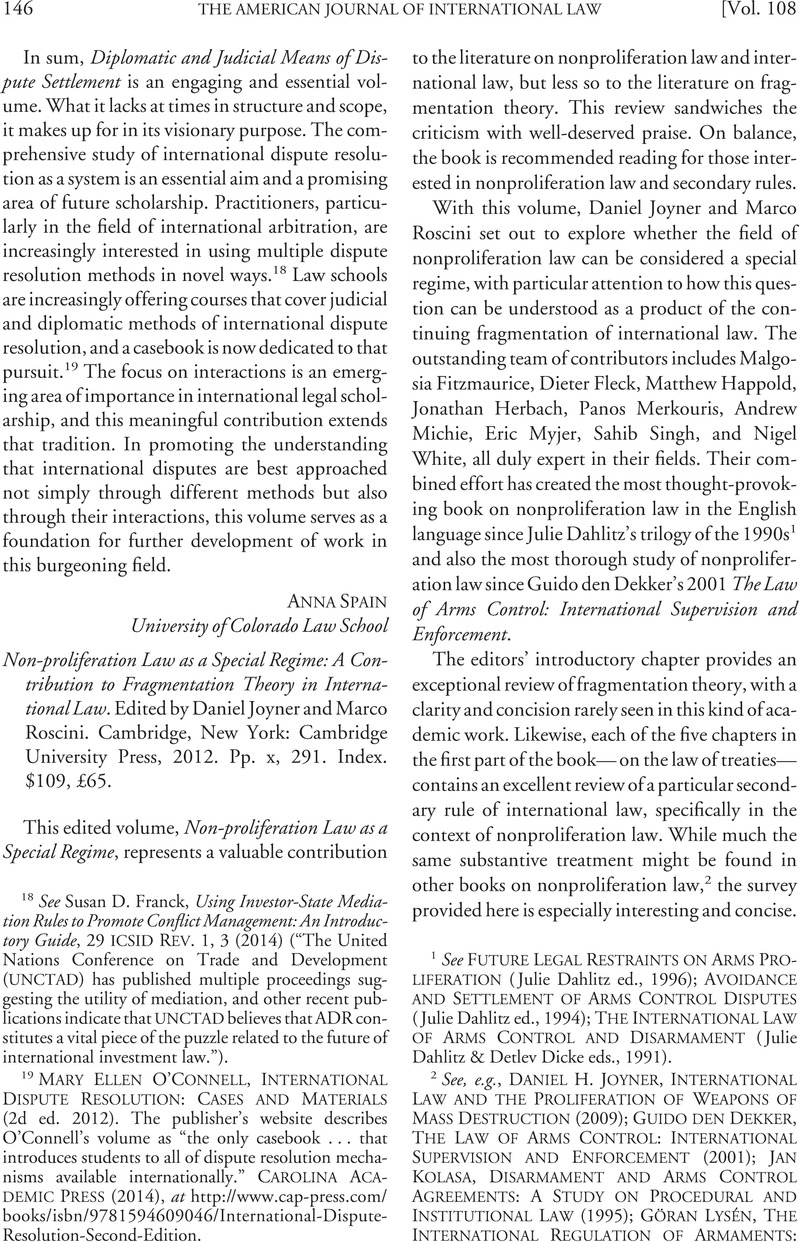No CrossRef data available.
Published online by Cambridge University Press: 20 January 2017

1 see Future Legal Restraints on Arms Pro Liferation (Julie Dahlitz ed., 1996); Avoidance and Settlement of Arms Control Disputes (Julie Dahlitz ed., 1994); The International Law of Arms Control and Disarmament (Julie Dahlitz & Detlev Dicke eds., 1991).
2 See, e.g., Daniel H. Joyner, International Law and the Proliferation of Weapons of Mass Destruction (2009); Guido Den Dekker, The Law of Arms Control: International Supervision and Enforcement (2001); Jan Kolasa, Disarmament and Arms Control Agreements: A study on Procedural and Institutional Law (1995); Góran Lysén, The International Regulation of Armaments: The Law of Disarmament (1990); Allan Gotlieb, Disarmament and International Law: A Study of the Role of Law in the Disarmament Process(1965); Andrew Martin, Legal Aspects of Disarmament (1963).
3 See, e.g., Smith, Edwin M., Understanding Dynamic Obligations: Arms Control Agreements, 64 S. Cal. L. REV. 1549, 1549 (1991)Google Scholar; Mellor, Justin, Radioactive Waste and Russia’s Northern Fleet: Sinking the Principles of International Environmental Law, 28 Denv. J. Int’l L. & Pol’y 51, 68 (1999)Google Scholar; Sathirathai, Surakiart, Peace and Security: The Challenge and the Promise, 41 Tex. Int’l L.J. 513, 523 (2006)Google Scholar; Gowlland-Debbas, Vera, Security Council Enforcement Action and Issues of State Responsibility, 43 Int’l & Comp. L.Q. 55 (1994)CrossRefGoogle Scholar.
4 See, e.g., Góralczyk, W., The New Law of the Sea, 10 Polish Y.B. Int’l L. 141, 141–42 (1979)Google Scholar (summarized in K. Grzybowski, Book Review, 77 AJIL 205, 205–06 (1983)).
5 See, e.g., Abi-Saab, Georges, The Normalization of International Adjudication: Convergence and Divergencies, 43 N.Y.U. J. Int’l L. & Pol. 1, 12 (2010)Google Scholar.
6 See generally Regime Theory and International Relations (Volker Rittberger ed., 1992).
7 International Law Commission, Conclusions of the Work of the Study Group on the Fragmentation of International Law: Difficulties Arising from the Diversification and Expansion of International Law, para. 11 (2006), at http://legal.un.org/ilc/texts/instruments/english/draft%20articles/1_9_2006.pdf.
8 See, e.g., Moeckli, Daniel, The Emergency of Terrorism as a Distinct Category of International Law, 44 Tex. Int’l L.J. 157, 158 (2008)Google Scholar.
9 Edited by Tomer Broude and Yuval Shany.
10 Simma, Bruno & Pulkowski, Dirk, Of Planets and the Universe: Self-Contained Regimes in International Law, 17 Eur. J. Int’l L. 483, 490–91 (2006)CrossRefGoogle Scholar.